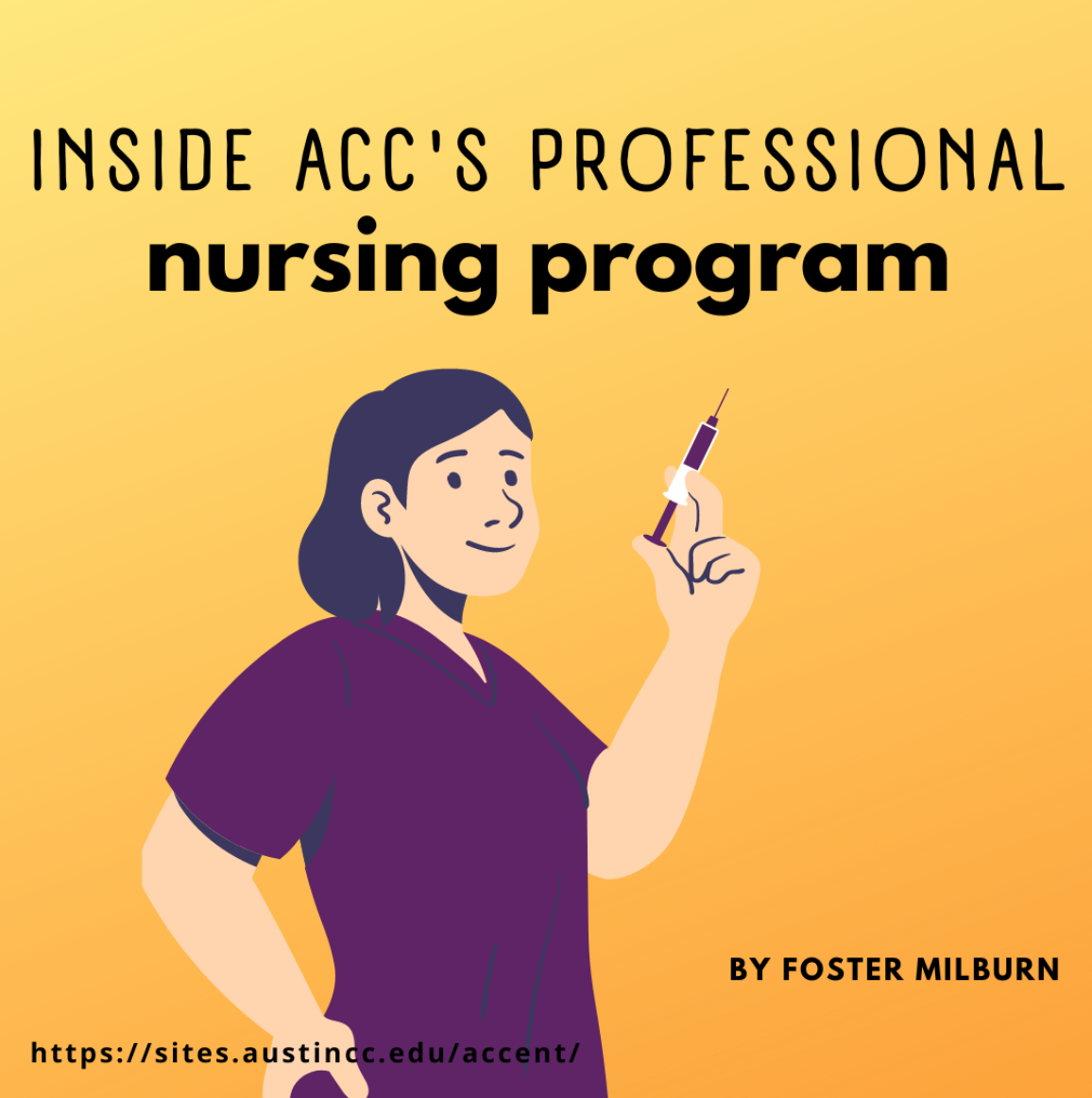The Health Sciences department at ACC has a profound reputation in Austin.
by Foster Milburn
Graphic by Claudia Hinojos
Health science students at Austin Community College are prepared for the fast-growing healthcare industry as the college offers a flexible education pathway, realistic hospital settings, and a high state pass rate.
A career as a registered nurse might be ideal for students who are driven to help others and are passionate about science.
Post COVID, the supply and demand for nurses has resulted in a shortage of nurses globally. With the high demand, the pay remains an appealing incentive for entering the work field.
According to Indeed, the average yearly salary for a registered nurse (RN) in Texas is $89,905; a well-paying salary in the field results from the long hours and the emotional pressure of being a nurse.
At ACC, students have a wide range of options in picking their major or starting a trade-specific program.
Professional nursing is different from other areas of study as it requires the student to apply and be accepted into the program, whereas other studies are open to students at any time. To be registered in this program, students are also expected to complete a series of prerequisites.
If a student is interested in nursing, they should go to the ACC website. Professor Abraham, an Associate Degree Nursing (ADN) level two professor, advises: “Definitely, the Health Sciences page is the best place to start.”
One thing to think about prior to considering nursing school is the complexity and dedication required. “What helps is having a realistic goal when starting nursing school,” Professor Abraham said.“Nursing school is a full-time job.”
That might raise the question of whether you can work outside the classroom to provide income for your living expenses beyond what you receive from loans. “Yes, you can. It will not be easy, but it is possible.” Christina Berger, a level II ADN Student at ACC and a mother of two, points out.
For many students, having a job while in school is necessary. An outside income is a requirement as some live independently or have children. Christina Knighton discussed working while being in the program. “I understand that it is reality, and we can’t not all work. Students have scaled back their hours to ensure they have more time for the program,” she said.
So, you might be wondering what other options are available. Knighton brings up the option of saving between semesters to have extra income during semesters. “This program is a full-time job,” she said.
With the disclaimers addressed, it would be best to meet with an advisor if a student is still interested in starting the program. It can be something other than Health Sciences, too.
Christina Knighton spoke about her personal experience with her advisor, “I started by speaking to my advisor, who gave me information about the prerequisites for the ADN program. She helped me stay on track and made sure I met the deadlines for application.”
The application process can be confusing for students navigating through the steps for the first time. It is much more information than other programs of study because it is specialized and more selective.
However, that does not mean there aren’t people to help you along the way. Because of having high standards going into the program, the resources continue beyond the application process.
“Once in the program, there are retention services available that can help with financial aid, study tips, and time management,” Knighton said.
Regarding the prerequisites, one might ask if they are beneficial to the courses they are required to take. For the professional nursing program, ADN, the associate degree plan requires four prerequisites. If taken subsequently, the classes can be completed in approximately three semesters.
“Pharmacology and Anatomy & Physiology give you the foundation for going into nursing school,” Knighton said. “When you have a deeper understanding of how the body works, it is easier to understand the disease processes you learn about once in the program.”
Secondly, the other requirement for applying for admission into the program is the HESI exam. The exam is a test that covers the material learned in the prerequisites where students are “tested on knowledge and how you would apply that knowledge in a clinical setting,” Knighton said.
The HESI Admission Assessment fee is currently at $62.00. The minimum passing score is 75 percent, and the test covers anatomy, physiology, math, reading, grammar, and critical thinking.
The HEXI exam varies in complexity. “Exposure to NCLEX style questions helps a lot when preparing for the HESI or nursing school exams in general,” Knighton said.
The NCLEX is the exam taken after completion of the program. “You can find them online, and there are many apps you can download for free,” Christina Berger said.
To conclude, it is best to speak directly with an advisor if one is considering the Nursing program or any other Health Sciences program. They can give you more personable advice while understanding your circumstances.
The nursing program here at ACC has an outstanding reputation within Texas and across the country. Austin American-Statesman presented the program with the 2020 Best of the Best Award on Jan. 11 of last year – an endowment worthy of what it offers.



